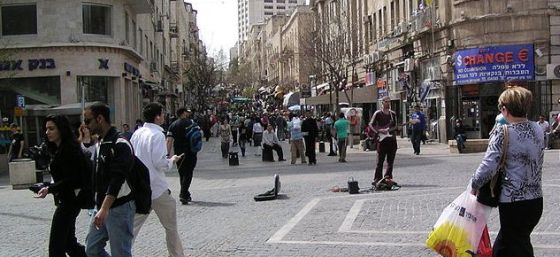
Jesse Benjamin writes: The news of an attempted mob lynching in Jerusalem’s Zion Square is trickling into Western news sources. It has been translated from angst-filled Hebrew-language Facebook pages written by eyewitnesses, stunned and harassed first responders, and translations gleaned from Haaretz via Mondoweiss, IMEU and others. The lack of outrage, and coverage, is almost as disturbing as the street level racial violence that showed itself in the heart of Israel, rolling in from the Wild West/West Bank where this is more common.
As I processed this, and recalled my own experiences in this exact spot, it seemed that somebody needed to shed light on what the significance of Zion Square is, why mob violence there is especially significant, and why Jews especially need to see this moment as yet another wake up call. My own privileged perspective on this is far removed from the daily violence and dispossession of Palestinian experiences, but my intention is to push other privileged Jews, Israelis and far away Western liberals to take this incident more seriously. Writing from Atlanta, I also want to underscore what the idea of lynching means, and what histories this act is therefore irrevocably connected to.
Zion Square was a refuge for me as a 16 year old. I slipped out the yeshiva side door and chose to live there, on the street, as a pathway to reinvention. The hippie musicians and jewelry makers who lined the streets back then, in 1987, took me in, and I eventually made it off the street, into a youth hostel where I got a bed in exchange for selling beer and running errands. I was an Israeli/US citizen who grew up secular in Toronto and upstate New York, before becoming a teenage Hassid in Brooklyn, en route to Israel and eventual re-engagement with my natal society. I became friends with 16 year olds Israelis who, unlike me, could not get a one-year deferment from military service or make a plan to get out before the draft grabbed hold of their lives. They were beatnikim , Hebrew plural for beatniks or hippies, in open rebellion and angst at the violence of military service that awaited them inescapably in a few short months, smoking hash, growing long hair, engaging world travelers and sometimes Palestinians anyone in our mixed street world in deep philosophical/political discussions about how to end, avoid or cope with the conflict. It was a powerful coming of age for me, and the pedestrian mall of Ben Yehuda, ending in the stone courtyard of Zion Square, was the hub of this activity, the nerve center of integration, questioning, folk music, exchange students, and occasional political protest. Ok, it was not utopian, things were already pretty segregated, and structural imbalance was already endemic, but it was very different then than now.
I left Israel in 1988, and returned a year later with a final one-year deferment, to study and check in on my still yeshiva-bound brother. All my friends were gone from the street, off to the front lines of the Intifada, carrying out Ariel Sharon’s orders to break the bones of young Palestinian protesters. When I did see them on Zion Square, they were broken people, with vacant eyes, literally unable to embrace me and engage in conversation of any kind. They were rushing to the bars to drink themselves into oblivion, filled with post-traumatic stress and suppressed rage/trauma, from the violent contradiction between their peace-loving souls and their new roles as occupation troops. Their long curly hair had been shaved to the scalp, and with it any pretense of humanity. Recognizing me long enough to talk and share was too painful for my old buddies. This was a shocking personal experience of Israel’s dissipating soul, and it also happened at Zion Square. Younger Israeli beatnikim continued to make the scene and mix with travelers and students, but the number of Palestinians who were willing to congregate or just pass through before sundown was already decreasing precipitously. [Continue reading…]

